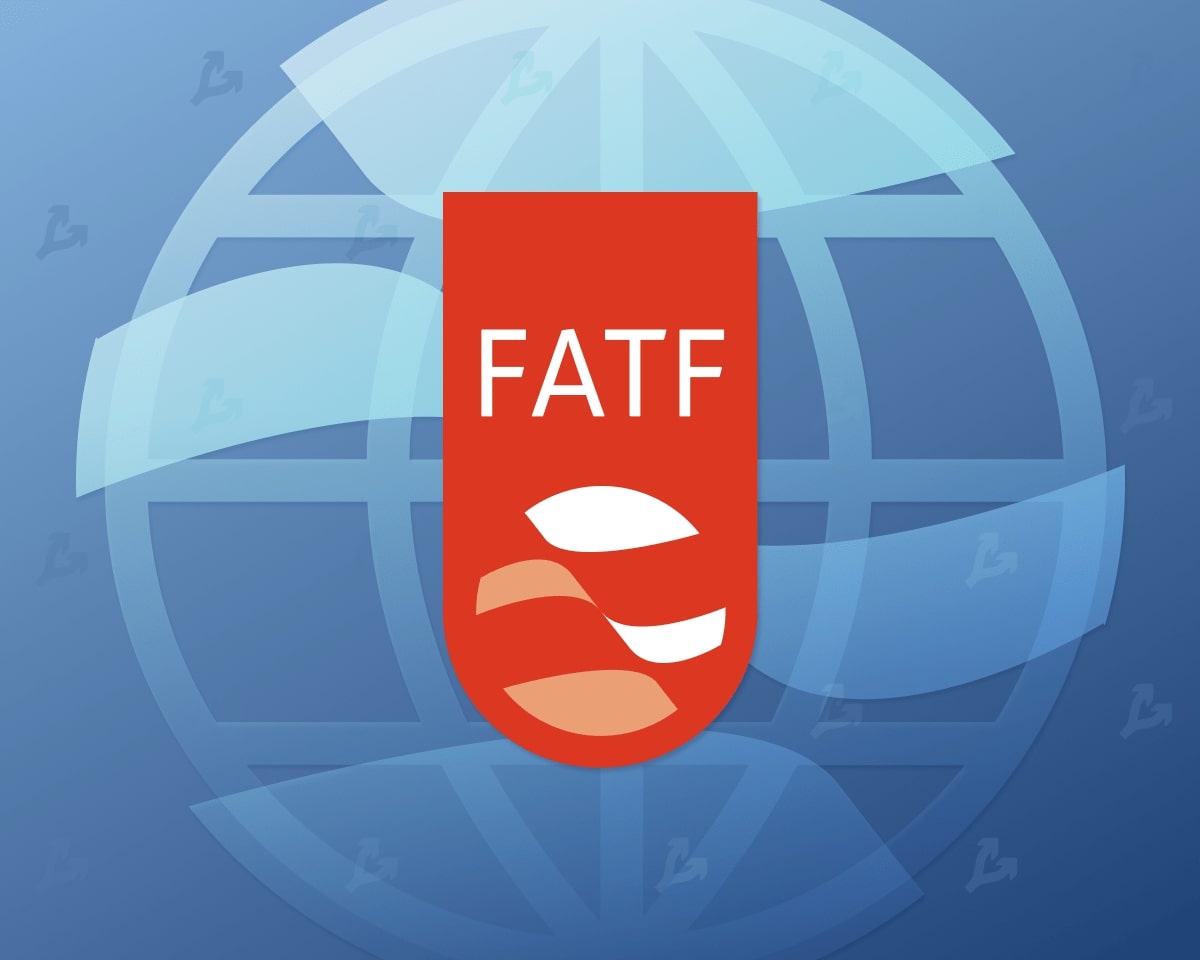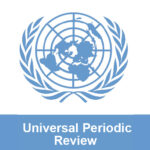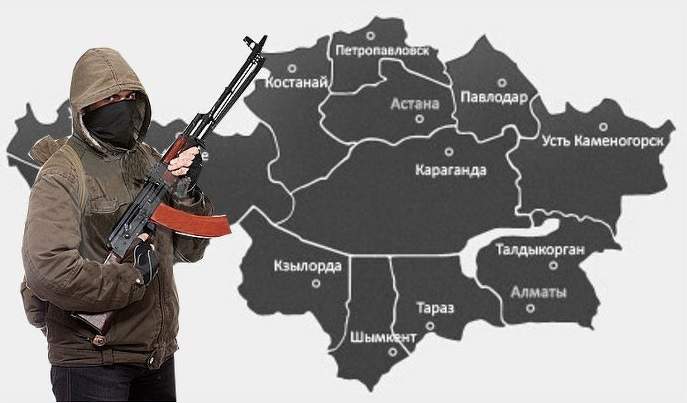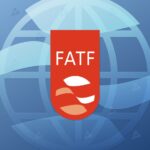1. The Kazakh legislation on the fight against terrorism and its financing widely uses the legally vague term “extremism” in addition to the term “terrorism”.
As a result, e.g., the Law of the Republic of Kazakhstan, 2009 “On Countering the Legalization (Laundering) of Proceeds from Crime and the Financing of Terrorism”, despite its name, mentions the term “extremism” in a number of its articles, in particular, in Article 12 “Targeted Financial Sanctions to Prevent and Avoid Terrorism and its Financing”. Furthermore, in addition to 1999 RK Law on Countering Terrorism, there is a separate 2005 RK Law on Countering Extremism.
Finally, the Criminal Code of the Republic of Kazakhstan contains 12 articles that establish the criminal liability for the so-called “extremist crimes”, including Article 174 “Inciting Social, National, Tribal, Racial, Class or Religious Discord”, Article 179 “Propaganda or Public Calls for Takeover or Retention of Power, or Forcible Change of the Constitutional System of the Republic of Kazakhstan”, Article 182 “Creation, Leadership of, or Participation in an Extremist Group”, Article 258 “Financing of Terrorist or Extremist Activities or Other Aiding Terrorism or Extremism”, Article 260 “Undergoing Terrorist or Extremist Training”, Article 404 “Creation, Management and Participation in Illegal Public or Other Associations” (parts 2 and 3), and Article 405 “Organization and Participation in a Public or Religious Association or Other Organization after a Judgement on Prohibition or Liquidation Thereof due to the Extremist or Terrorist Activities Practicing thereby”.
Persons found guilty of committing “extremist” crimes are often subjected to additional punishment in the form of a ban on engaging in “social activities”. Given that the Kazakh law does not define the term “social activity”, the courts impose prohibition on such persons, for example, to organize or participate in peaceful assemblies, use the Internet or participate in the activities of public organizations.
Finally, based on Article 12 of the RK Law On Countering the Legalization (Laundering) of Proceeds from Crime and the Financing of Terrorism, a List has been created containing entities and individuals associated with the financing of terrorism or extremism, such List being automatically updated with names of all persons convicted of all terrorist or extremist crimes, regardless of whether they were involved in the financing of terrorism or not. The persons included in the List remain listed therein until the end of their criminal record, that is, the entire term of punishment plus the term of possible additional punishment in the form of deprivation of the right to engage in public activities, which may be imposed for a period of 1 to 10 years, plus a criminal record term of 6 or 8 years, depending on the severity of the crime. That is, after the end of the term of punishment (usually in the form of imprisonment), a person remains included on the List for several years, which may be up to 18 years.
The List restricts persons included therein from withdrawing money from bank accounts (only in the amount of a minimum wage per family member per calendar month), the ability to open a business or work as an individual entrepreneur, enter insurance contracts and imposes a number of other restrictions.
Such use of the term “extremism” is substantially similar, in terms of legal consequences and restrictions, including in the financial sphere, to the use of the term “terrorism” and has a direct adverse impact on the civil society and human rights and freedoms, in particular on the freedom of speech and expression, freedom of association and peaceful assemblies and other rights.
These problems were highlighted by the UN Special Rapporteur on the rights to freedom of peaceful assembly and freedom of association, who visited Kazakhstan in 2015 (A/HRC/29/25/Add.2*), the UN Special Rapporteur on the promotion and protection of human rights and fundamental freedoms in the context of the fight against terrorism, who visited Kazakhstan in 2019 (A/HRC/43/46/Add.1), as well as by the UN Human Rights Committee in 2016 upon reviewing the periodical report of the Republic of Kazakhstan on the implementation of the International Covenant on Civil and Political Rights (CCPR/C/KAZ/CO/2).
Recommendation. To exclude the term “extremism” from the laws of the Republic of Kazakhstan as being extremely vague, undefined legally and clearly and used in breach of the International Convention for the Suppression of the Financing of Terrorism, where such term is not used, and FATF Recommendation 8, which does not use such term either.
2. Special law. A key piece of legislation in this area is the Law of the Republic of Kazakhstan “On the Fight Against the Legalization (Laundering) of Criminal Proceeds and the Financing of Terrorism” as amended in July 2018, and May and June 2020 (hereinafter, the Law on FLCP/FT). In accordance with the latest amendments dated 13 May 2020, the Law on FLCP/FT was supplemented with a new Article 12-2 concerning NGOs, which comes into effect on 15 November 2020:
“Article 12-2. Measures to protect charitable organizations and religious associations against being used to finance terrorism
1. Charitable organizations as well as religious associations that seek voluntary donations shall take measures to ensure their activities will not be used for the purposes of financing of terrorism, and shall also be obliged to:
1) make payments and money transfers at the request of third parties or on their own initiative through entities that are subject to financial monitoring;
2) provide the authorized agency, upon the latter’s request, financial reporting on transactions with money and/or other property, as well as information on risks that have been identified;
3) ensure the information on their transactions with money and/or other property that is subject to mandatory state registration, as well as about their founders (participants), is safely stored for a period of at least five years;
2. Should a charitable organization or a religious association have grounds to suspect they might be used for the purposes of financing of terrorism, they shall provide the relevant information to the authorized body.
The requirements stipulated in this article are not burdensome, but the fact that these two types of NGOs (charitable and religious) have been selected in particular to be regulated under this law is not based on the results of an assessment of the risks of financing terrorism in the sector of NGOs, which essentially means such a selection is incompliant with the FATF international standards.
Recommendation. Assessments of risks to ensure risk criteria are determined more precisely should be conducted on a regular basis.
3. Criminal and administrative liability. The Criminal Code and the Code of Administrative Offenses contain articles that stipulate liability for offenses in this area (Article 218 of the Criminal Code of the Republic of Kazakhstan, “Legalization (laundering) of money and/or other property obtained by way of a crime,” Article 214 of the Criminal Code of the Republic of Kazakhstan, “Violations of the Law of the Republic of Kazakhstan on the fight against legalization (laundering) of criminal proceeds and the financing of terrorism,” etc.)
Amendments to the Law on FLCP/FT dated 13 May 2020 also introduced additional liability for subjects of financial monitoring for non-compliance with the requirements of the Law on FLCP/FT in terms of failure to provide information upon request of the authorized body—this provision will enter into force on 15 November 2020. Thus, Article 214 of the Code of Administrative Offenses of the Republic of Kazakhstan introduces administrative liability for:
“- failure to provide, delay in the provision by the subjects of financial monitoring of information on transactions with money and (or) other property that is subject to financial monitoring, as stipulated in clauses 3 and 5 of Article 4 of the Law of the Republic of Kazakhstan “On the Fight against Legalization (Laundering) of Criminal Proceeds and the Financing of Terrorism,” in the form of a fine for individuals in the amount of fifty, … for non-profit organizations in the amount of one hundred and forty … times the monthly calculation index.
– failure to provide, delay in the provision by the subjects of financial monitoring of information, data and documents upon request of the authorized body in the area of financial monitoring – in the form of a fine for individuals in the amount of thirty, … for non-profit organizations in the amount of eighty… times the monthly calculation index.
– failure by the subjects of financial monitoring to fulfill training programs in the field of fight against legalization (laundering) of criminal proceeds and the financing of terrorism as approved by the rules of internal control, in the form of a fine for individuals in the amount of twenty, … for non-profit organizations in the amount of fifty … times the monthly calculation index.
– failure to provide, delay in the provision by the subjects of financial monitoring of information on transactions with money and/or other property which is subject to financial monitoring, as stipulated in clause 1 of article 4 of the Law of the Republic of Kazakhstan “On the Fight Against Legalization (Laundering) of Criminal Proceeds and the Financing of Terrorism,” in the form of a fine for individuals in the amount of thirty, … for non-profit organizations in the amount of eighty times the monthly calculation index.”
Every year, provisions pertaining to violations of the FATF requirements in Kazakhstan have been getting more detailed and wider in scope.
Recommendation. Discriminatory provisions in relation to NGOs should be removed from the legislation of the Republic of Kazakhstan as inconsistent with the FATFs Recommendation 8.
4. NGOs reporting. As a separate block, comes the legislative norms that establish requirements for additional reporting by NGOs in connection with FATF recommendations. That block includes, as an example, the Law of the Republic of Kazakhstan dated 16 November 2015 No. 403-V “On Amendments and Additions to Certain Legislative Acts of the Republic of Kazakhstan Pertaining to Charity;” the Law of the Republic of Kazakhstan dated 2 December 2015 No. 429-V “On Amendments and Additions to Certain Legislative Acts of the Republic of Kazakhstan on the Activities of Non-Governmental Organizations;” the Law of the Republic of Kazakhstan on Amendments and Additions to Certain Legislative Acts of the Republic of Kazakhstan Pertaining to Payments and Payment Systems dated 26 July 2016 No. 12-VI ZRK, etc., as well as numerous by-laws and amendments that have been adopted.
For instance, Order of the Minister of Culture and Sports of the Republic of Kazakhstan dated 19 February 2016, no. 51 “On the approval of the Rules for the provision by non-governmental organizations of information on their activity and for the formation of a database on the same.” Those regulations provide a requirement of additional reporting for non-profit organizations that are financed from foreign sources (with the exception of political parties, trade unions, religious organizations), and for charitable organizations.
Recommendation. The mandatory requirement of additional reporting for NGOs should be removed from the legislation of the Republic of Kazakhstan as a norm that is discriminatory and inconsistent with FATF’s Recommendation 8.
5. Regulation of subjects of financial monitoring. There is one other block of legislation that regulates the activity of entities that are subject to financial monitoring and has an impact on the financial operations of NGOs. For instance, Order of the Minister of Finance of the Republic of Kazakhstan dated 30 September 2020 no. 938 “On the approval of the Rules for submission by the subjects of financial monitoring of reports and information on operations that are subject to financial monitoring, and on determining the features of a suspicious transaction” which came into force on 7 October 2020 (hereinafter, the 7 October 2020 Order) and replaced Resolution of the Government of the Republic of Kazakhstan dated 23 November 2012 no. 1484 “On the approval of the Rules for submission by the subjects of financial monitoring of reports and information on operations that are subject to financial monitoring, and on determining the features of a suspicious transaction”[1]; Joint Order of the Minister of Finance of the Republic of Kazakhstan dated 28 September 2020 no. 928 and the Minister of Justice of the Republic of Kazakhstan dated 29 September 2020 no. 427, “On the approval of Requirements for the rules of internal control for the purpose of fight against legalization (laundering) of criminal proceeds and the financing of terrorism for notaries,” etc.
Those orders were developed and adopted in compliance with the Law on FLCP/FT and FATF International Standards. According to Article 1 of the Law of the Republic of Kazakhstan on FLCP/FT, “a suspicious transaction with money and/or other property (hereinafter, “a suspicious transaction”) means a client’s operation (which includes an attempt to conduct such a transaction, an actual transaction that is in the process of being conducted, as was a transaction that has already been conducted) in whose relations grounds exist to believe that the money and/or other property used for such a transaction constitute criminal proceeds or if the operation itself is aimed at legalizing (laundering) proceeds obtained by way of a crime or financing of terrorism or other criminal activity.”
According to Article 4 of the Law of the Republic of Kazakhstan on FLCP/FT, “suspicious transactions shall be subject to financial monitoring regardless of the form in which they have been conducted or the amount of money they are, may, or might have been, committed. The features on which a transaction is determined as suspicious are approved by the Government of the Republic of Kazakhstan.
In the aforementioned orders, it is stipulated that if the client is a non-profit organization increases the risk of ML/FT.
According to Annex 2 to Order dated 7 October 2020, the features on which a transaction is determined as suspicious include the following:
– Conducting transactions with money and/or other property with the participation of non-profit organizations that pertain to charitable activity and/or other donations (with the exception of transactions that are specified in code 3003).
– Money coming from abroad on the accounts of non-profit organizations.
– A transaction involving a non-profit organization (with the exception of transactions pertaining to payments of taxes, other mandatory payments to the budget, penalties and fines, pensions and social deductions, membership fees, utility payments, insurance premiums under mandatory insurance contracts, as well as operations specified in codes of signs of suspicious transactions 1040, 3002, 3003, 3004 and 1041).
– Conducting transactions with money and/or other property pertaining to a charitable activity and/or other donations, with the exception of a non-profit organization participates.
– Conducting transactions with money and/or other property which involve non-profit organizations with a religious orientation (with the exception of transactions pertaining to payment of taxes, other mandatory payments to the budget, penalties and fines, pensions and social deductions, membership fees, utility payments, or insurance premiums under mandatory insurance contracts).
A review of aforementioned criteria for classifying a transaction as suspicious demonstrates that the legislator considers as such not only transactions in which religious non-profit organizations and organizations working in the area of charity and/or other donations are involved, but also any transactions that involve any other type of non-profit organizations. This fundamentally contradicts the FATF recommendations and standards.
The Law on FLCP/FT, on and by itself, also allows for recognizing transactions as increased risk if non-profit organizations are involved in them. Meanwhile, during the discussion of the draft Law on FLCP/CFT, the First Deputy Prime Minister—Minister of Finance Mr. Alikhan Smailov, while speaking to the MPs, stated that “in order to implement international standards, the draft law will include certain amendments intended to protect the non-commercial sector from being used for the purposes of financing of terrorism. The requirements will apply to charity organizations and religious associations that seek voluntary financial and other donations.” He also clarified that those norms would be introduced following a recommendation from FATF, because, in his words, “based on the research by international organizations, it is precisely religious and charitable organizations that are most vulnerable in terms of risks of financing of terrorism, because it is them that are involved in the collection and distribution of monetary funds.”[2]
Firstly, when making such decisions that limit the rights of Kazakhstani organizations it is not sufficient to be guided by the research carried out by international organizations alone; it is necessary to conduct research in Kazakhstan, conduct joint assessment of risks in the NGO sector (CFM and NGOs), and take other action as recommended by FATF. Based on the results of such a comprehensive analysis it will become clear whether charitable and religious organizations in Kazakhstan should be placed under enhanced financial supervision, and if so, whether it makes sense to limit them to only those organizations that accept cash-only donations.
Secondly, the legislation on FLCP/FT considers all non-profits as high-risk clients a priori, because any transaction involving a non-profit is deemed suspicious. For a number of years, non-profit organizations when talking to the banks and other subjects of financial monitoring have been automatically designated as high-risk clients that must be subject to financial supervision, while even an ordinary financial transaction could turn into a long and painful process of non-profits going back and forth to the bank with a pile of documents, trying to prove the money they receive or send is legal.
Recommendation. Risk assessments should be conducted on a regular basis to determine more accurate risk criteria. A country-wide study should be carried out and information gathered on the facts that confirm that the non-profits are especially vulnerable when it comes to FLCP/FT.
Drafted by:
Yevgeny Zhovtis
Tatyana Zinovich
Gulmira Kuzhukeyeva
Svetlana Ushakova
[1]On the approval of the Rules for submission by the subjects of financial monitoring of reports and information on operations that are subject to financial monitoring, and on determining the features of a suspicious transaction. Resolution of the Government of the Republic of Kazakhstan dated 23 November 2012 no. 1484. URL: http://adilet.zan.kz/rus/docs/P1200001484
[2]The authorities will monitor the finances of charitable non-profit organizations. Forbes Kazakhstan. 11/ ltrf,hz 2019/ URL: https://forbes.kz//process/vlasti_budut_monitorit_finansyi_blagotvoritelnyih_nekommercheskih_organizatsiy/?










